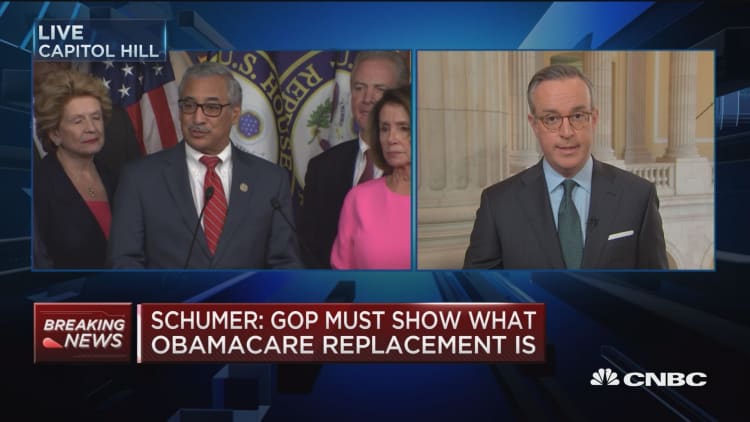6.4 million Americans have already signed up for healthcare coverage under the Affordable Care Act, often called Obamacare, for 2017. If you haven't enrolled and need healthcare coverage, the time is now — especially since the Republican Congress under President-elect Donald Trump is poised to eliminate the program.
Here's what you need to know if you want to apply.
It isn't too late
You have between now and January 30 to find out if you are eligible for and secure health care coverage for this year.
If you miss this the Open Enrollment Period, you have to wait until November 2017 to enroll for 2018, assuming that will still be possible. A significant life event, such as the loss of a job, the birth of a baby, or a change in marital status, could make you eligible for insurance during a Special Enrollment Period.
It will help to be prepared
Enroll online at https://www.healthcare.gov, which serves 39 states; via the online portal for your state's exchange; or in person in your community. But know going in that the process can be complicated.
Before you start, find out what paperwork and documentation you need to have in order to enroll. A copy of last year's taxes might be helpful, as would a phone to call the helpline if necessary.
Plan on spending at least 90 minutes to complete the forms.
You can pay now or pay later
Pick your plan wisely. Some more elaborate Gold and Platinum plans have higher premiums, or amounts you'll need to pay upfront each month, but they will ultimately cover more of your medical bills. If you know you have to schedule or undergo a costly procedure this year, a Gold or Platinum plan, however expensive, might still end up being the better value.
On the other hand, a Bronze or, in some cases, Silver high-deductible plan could make you eligible to take advantage of a Health Savings Account (HSA). Silver plans, which cover about 70% of healthcare costs incurred by patients, are the most popular options.
Always compare levels between insurers. A Bronze plan from one provider could actually give you more coverage than a Gold plan from another. And remember that, the lower the premium, the higher the deductibles on out-of-pocket costs that you have to fulfill before your insurance kicks in.
You still have to budget for monthly expenses
Enrolling in a plan isn't the last step in being covered for the year. When you select the plan you want, you will be quoted a monthly premium. You'll need to pay premiums on time or your coverage will be cancelled and you could be subject to the tax penalties for not having coverage.
You shouldn't assume you can't afford it
Yes, a lot of these plans' monthly premiums are expensive. But don't assume that you can't afford insurance. Based on your income, you could qualify for a substantial subsidy from the government. And depending on the state you live in, you may be eligible under the Medicaid expansion, which offers coverage to individuals and families making 137 percent of the U.S. Poverty Level.
Not all states offer expanded Medicaid coverage. But even if your state chose not to participate in the Medicaid expansion, it may offer residents an alternative.
Don't give up and go without — you could face penalties
If you don't have health care coverage now either through an employer subsidized plan or a government program such as Medicaid or Medicare, you must enroll in a qualified plan by January 30, or you could be subject to an IRS penalty of 2.5 percent of your household income or $695 per individual and $347.50 per child.
Andrea King Collier is a freelance journalist and author whose writing has appeared in O the Oprah Magazine, Next Avenue, Chase, GOOD, Salon, and elsewhere.


